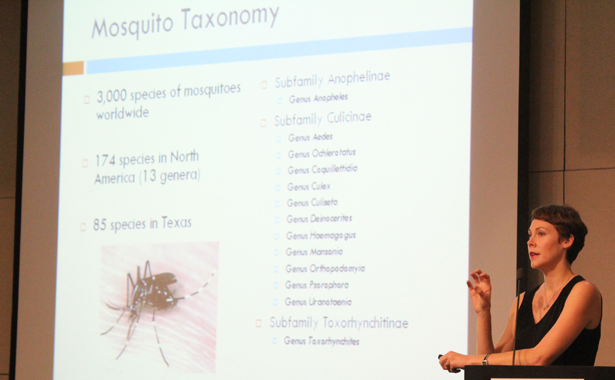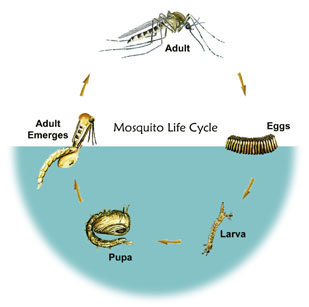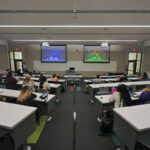
By Melody Mendoza
Texas has seen the highest accounts of West Nile virus cases, totaling 888 according to a Sept. 4 report from the Centers for Disease Control and Prevention, and a total of 1,993 in the United States.
Molly Keck, entomologist from Texas A&M AgriLife Extension, said predictions are that the virus has not reached its peak yet.
Keck was the speaker of “West Nile virus/ Mosquito 101,” an information session hosted by the San Antonio Public Library Sept. 6.
Keck said educators from the Integrated Pest Management program of the AgriLife Extension, take the research developed by members of The Texas A&M System to inform the community, in this case, about West Nile virus.
As the virus continues to spread via the fast-multiplying mosquito, the AgriLife Extension is one community entity reaching out to inform residents about the virus and prevention methods.
During the session, Keck spoke to about 25 residents of San Antonio about repellents and pesticides and basic facts to understand mosquitoes and how they breed.
The virus, first discovered in the United States in 1999, survives through the winter in birds, the primary reservoir. Each summer through the fall, when mosquitoes are most active, the virus spreads.
“This is just a far worse outbreak than we’ve ever had,” she said, adding that it could be because of the recent drought and then this year’s rain increase. But she said there is not a specific known reason.
A&M-San Antonio collaborates
Biology Professor Megan Wise de Valdez also saw the importance of connecting her students to the community effort by incorporating the session into her curriculum, while collaborating with an A&M System program.
Wise invited her BIOL 3375, Economic Entomology, class to the West Nile session for extra credit.
“Right now, our role in the community is through our collaborations with A&M AgriLife Extension and to whatever role that we can help them, and they us,” Wise said.
Wise said it is important to engage students in events happening today, and invited her class, which is studying insects, to the mosquito-related session.
“The more you know, the more you can do to protect yourself,” Wise said, “and the less anxious you feel about the world around you.”
Keck agreed: “Information is power.”
Keck offered four preventive measures:
• Personal protection,
• Reduce the breeding site by getting rid of still water polluted by organic waste,
• Reduce the adult mosquito population and
• Avoid going outside.
Although there is not a cure for West Nile, Keck said the University of Oklahoma is working on a vaccine, but added that it may take a few years to complete.
For now, Keck said personal protection is key and offered the four “D’s” — drain standing water, dress in loose clothing, don’t go out during dawn or dusk and use repellent with DEET.

The mosquito’s life cycle
To understand these suggestions, Keck covered the mosquito life cycle. The mosquito lives in the water for most of its life, which lasts only six days on hot days, and are only out of water in the final stage as an adult.
Because the life cycle is so short, two stages are most important for managing mosquitoes.
Female mosquitoes lay as many as 300 eggs in organically polluted water, so Keck encouraged residents to drain water that may sit in flower pots, buckets, tires or unkept up swimming pools. She added that mosquitoes won’t breed in filtered fountains or swimming pools because they don’t have food for the eggs.
In the second stage of the life cycle, a mosquito turns into a larvae, which Keck said is the best time a resident can kill the mosquitoes.
Keck said to block their airway, residents could cover the water surface with soap or oil. She also suggested Bacillus thuringiensis israelenensis, or Bti, which can be bought where pesticides are sold.
After a mosquito is an adult, personal protection also includes using the right kind of repellent; ones with DEET or picaridin are suggested.
Keck did not suggest using pesticides because it is a short-term solution to mosquitoes.
Getting to know the mosquito with the virus
Keck emphasized refraining from being outdoors during dawn and dusk because the mosquito species that are most likely to carry West Nile are out during those times.
The species, Culex mosquitoes, are more likely to carry the virus because they prefer birds, the main carrier of West Nile. Although mosquitoes have preferences, Keck said this won’t stop a mosquito from biting a nearby human.
Keck added that they are attracted to visual cues, like clothing with prints, moving objects and heat and humidity. She suggested loose clothing because mosquitoes can pierce through anything as long as its antenna.
For information on symptoms, treatment and more about the virus, visit CDC’s fact sheet.






